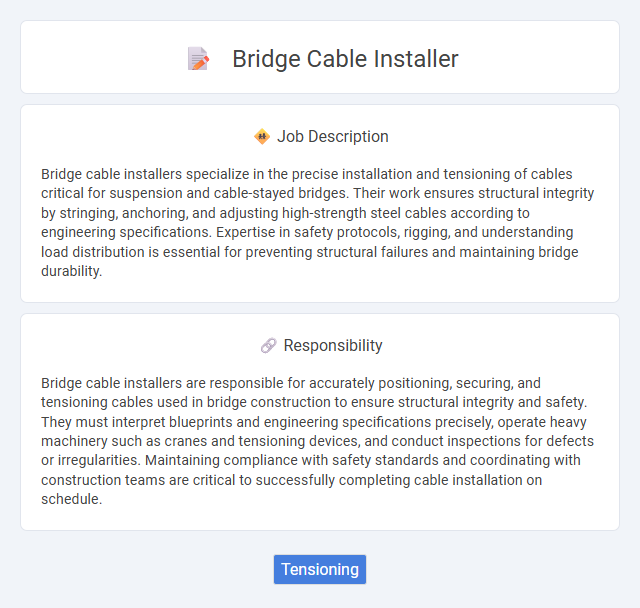
Bridge cable installers specialize in the precise installation and tensioning of cables critical for suspension and cable-stayed bridges. Their work ensures structural integrity by stringing, anchoring, and adjusting high-strength steel cables according to engineering specifications. Expertise in safety protocols, rigging, and understanding load distribution is essential for preventing structural failures and maintaining bridge durability.
Individuals with strong physical endurance and a tolerance for heights are more likely to be suited for a bridge cable installer job. Those without significant fear of heights or health issues related to strenuous labor probably have higher chances of adapting well to the demands of this profession. People who struggle with balance, physical strength, or have anxiety related to elevated work environments may find this job less suitable.
Qualification
Bridge cable installers require specialized knowledge in structural engineering principles and extensive experience with high-tension cable systems. Candidates must demonstrate proficiency in safety protocols, rigging techniques, and precision measurement tools to ensure cable placement accuracy. Certification in occupational safety and climbing skills are often mandatory to meet industry standards and regulatory compliance.
Responsibility
Bridge cable installers are responsible for accurately positioning, securing, and tensioning cables used in bridge construction to ensure structural integrity and safety. They must interpret blueprints and engineering specifications precisely, operate heavy machinery such as cranes and tensioning devices, and conduct inspections for defects or irregularities. Maintaining compliance with safety standards and coordinating with construction teams are critical to successfully completing cable installation on schedule.
Benefit
A bridge cable installer job likely offers competitive wages and opportunities for overtime pay due to the specialized nature of the work. Workers may benefit from hands-on experience with advanced engineering techniques, potentially enhancing career prospects in the construction industry. The role probably includes safety training and the chance to work outdoors on large infrastructure projects, which can be appealing for those who prefer dynamic, physical work environments.
Challenge
Bridge cable installer jobs likely involve significant physical and technical challenges due to the complexity of handling heavy cables at great heights. Workers probably encounter demanding environmental conditions, requiring strong safety awareness and precision. Mastery of specialized equipment and coordination with engineering teams might also be essential for successful cable installations.
Career Advancement
Bridge cable installer jobs offer significant potential for career advancement through hands-on experience with complex infrastructure projects. Mastery of cable installation techniques, safety protocols, and engineering blueprints can lead to promotions into supervisory or project management roles. Continuous training and certification in specialized equipment and construction standards further enhance opportunities for leadership positions in the bridge construction industry.
Key Terms
Tensioning
Bridge cable installers specialize in applying precision tensioning techniques to ensure structural integrity and load distribution in suspension and cable-stayed bridges. Using hydraulic jacks and sophisticated tensioning equipment, they adjust cable forces to meet engineering specifications and maintain bridge stability under dynamic loads. Mastery of tensioning parameters, combined with rigorous safety protocols, ensures long-term durability and safety of bridge structures.
 kuljobs.com
kuljobs.com